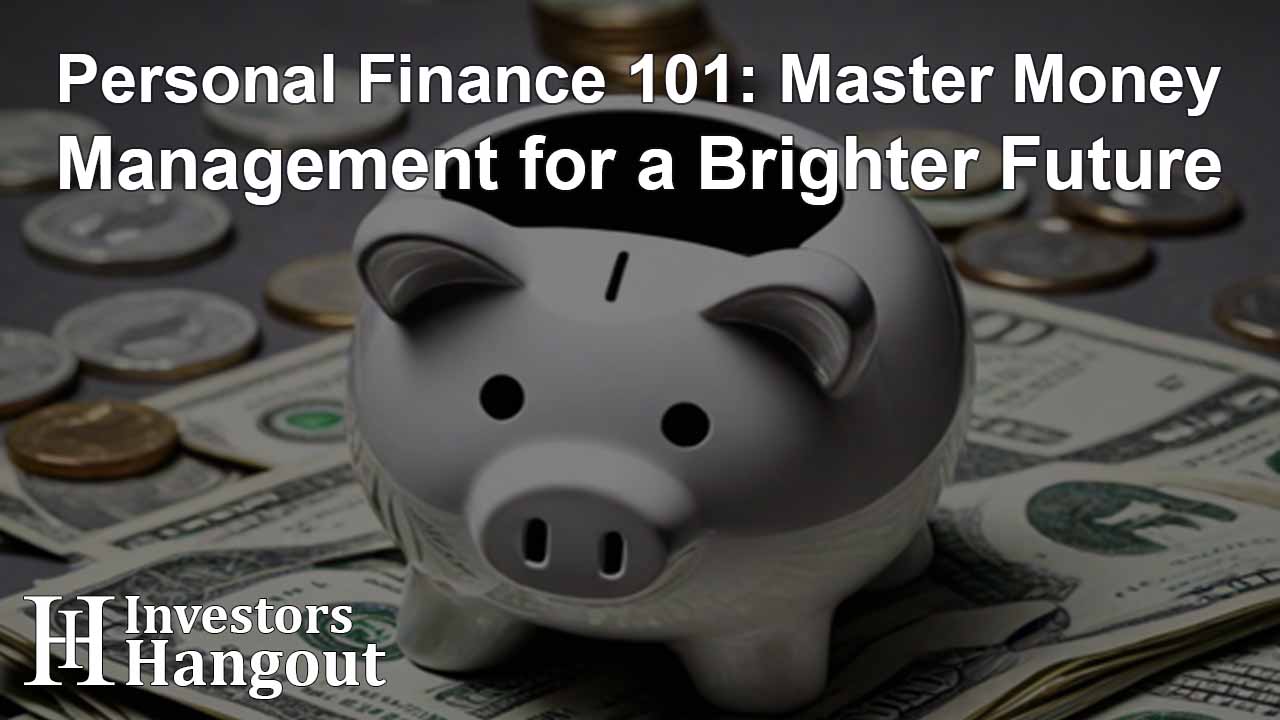Personal Finance 101: Master Money Management for a Brighter Future

Navigating the world of personal finance can feel like an overwhelming task, especially for young adults and newcomers to the world of investing and budgeting. However, with the right knowledge and tools at your disposal, managing your money effectively becomes an achievable feat, paving the way to financial freedom and stability. This comprehensive guide is designed to demystify the essentials of personal finance, offering practical advice and tips to help you take control of your financial destiny.
1. Introduction to Personal Finance and Its Importance for Young Adults and New Investors
Personal finance encompasses all decisions and activities related to managing one’s money, including budgeting, saving, investing, and planning for the future. For young adults and new investors, understanding personal finance is crucial. It not only helps in achieving short-term goals like saving for a vacation or a major purchase but also lays the foundation for long-term financial security and wealth creation.
2. Budgeting Basics: How to Create and Stick to a Budget
Budgeting is the cornerstone of effective financial management. It involves tracking your income and expenses to understand where your money is going and making informed choices about your spending.
- Start by listing your monthly income sources, including your salary, any side hustles, and passive income.
- Track your expenses over a month to identify necessary spending (rent, utilities, groceries) versus discretionary spending (eating out, entertainment).
- Set realistic spending limits for different categories, prioritizing savings and debt repayment.
- Using budgeting apps can streamline this process, making it easier to stick to your budget by providing real-time insights into your spending habits.
3. Understanding and Managing Debt Effectively
Debt can be a double-edged sword. While it can help you invest in your future, unchecked debt can impede your financial health.
- Prioritize high-interest debt, such as credit card balances, as it costs you the most over time.
- Consider debt consolidation or refinancing for more manageable interest rates and payment terms.
- Adopt the snowball or avalanche method to systematically pay down your debts, starting either with the smallest balances or the highest interest rates.
4. The Importance of Emergency Funds and How to Start Building One
An emergency fund is a financial safety net designed to cover unexpected expenses, such as medical emergencies or sudden job loss. Aim to save three to six months’ worth of living expenses.
- Start small, even saving a little each month can build up over time.
- Keep your emergency fund in a separate savings account to avoid the temptation to dip into it for non-emergencies.
- Automate your savings to ensure consistency.
5. Introduction to Investing: Principles and Beginner Tips
Investing is crucial for building wealth over time, offering higher potential returns than traditional savings accounts.
- Start with a clear goal (retirement, purchasing a home) to guide your investment strategy.
- Educate yourself on different types of investments (stocks, bonds, mutual funds) and their associated risks.
- Consider starting with a robo-advisor or low-cost index funds as they offer a simple, hands-off approach to investing.
6. Navigating Personal Finance Apps and Tools for Better Money Management
Technology can be a powerful ally in managing your personal finances. There are countless apps and tools designed to help you budget, invest, and save effortlessly.
- Budgeting apps like Mint or YNAB provide a comprehensive view of your finances, making it easier to stick to your budget.
- Investing apps such as Acorns or Robinhood simplify the investment process for beginners.
- Financial planning tools can help you track your progress toward long-term goals, adjusting your strategy as needed.
7. Long-Term Financial Planning for a Secure Future
Long-term financial planning involves setting financial goals and strategies for achieving them over time. It includes retirement planning, estate planning, and insurance coverage, ensuring that you and your loved ones are protected and financially secure in the years to come.
- Consider working with a financial advisor to create a tailored financial plan that aligns with your goals and life circumstances.
- Regularly review and adjust your financial plan to reflect changes in your income, goals, and life events.
8. Conclusion: Encouragement and Next Steps for Your Personal Finance Journey
Mastering personal finance is a lifelong process that requires patience, discipline, and continuous learning. The steps outlined in this guide provide a solid foundation, but remember, the most important step is to get started. Take one financial goal at a time, celebrate your successes, and learn from any setbacks. By staying committed to your financial well-being, you pave the way for a future filled with possibilities and security.
Your financial future starts today. With each decision, you have the power to shape it according to your dreams and aspirations. Remember, personal finance is just that—personal—and there's no one-size-fits-all approach. Find what works best for you, and take those steps towards financial independence and success.
About The Author
Contact Editor privately here. Or send an email with ATTN: Editor as the subject to contact@investorshangout.com.
About Investors Hangout
Investors Hangout is a leading online stock forum for financial discussion and learning, offering a wide range of free tools and resources. It draws in traders of all levels, who exchange market knowledge, investigate trading tactics, and keep an eye on industry developments in real time. Featuring financial articles, stock message boards, quotes, charts, company profiles, and live news updates. Through cooperative learning and a wealth of informational resources, it helps users from novices creating their first portfolios to experts honing their techniques. Join Investors Hangout today: https://investorshangout.com/